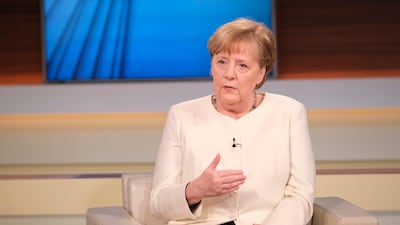German Chancellor Angela Merkel was criticised for failing to share a plan to reverse rising coronavirus infections and blaming regional presidents for the increasingly chaotic handling of the crisis.
The clock is ticking for Germany to reverse soaring infections which, according to its top public health official, could jump to 100,000 a day from 20,000 at present.
Germany stepped up lockdown measures in December to contain a second wave of infections. Cases have since risen, although the death rate has fallen.
On Monday, Mrs Merkel raised the possibility during a broadcast interview on Sunday of amending the Infection Protection Act to oblige Germany’s 16 states, which wield power over health and security, to bring in certain measures.
But she failed to say what that would entail, prompting rebukes from opposition parties and newspapers that she was “clueless” and “still has no plan”.
Mrs Merkel, whose conservatives are falling in the polls ahead of an election in September, expressed dissatisfaction with some state presidents for failing to reverse measures to reopen parts of the economy when cases start to rise, as agreed on March 3.
“Merkel should appear before parliament and state clearly how she sees the situation and what her proposals are,” Christian Lindner, leader of the opposition Free Democrats, told Phoenix television.
In the clearest sign that her authority is waning six months before her fourth and last term ends, Mrs Merkel said the leader of her Christian Democratic Union party had breached the March agreement by failing to reimpose lockdown measures in his own state of North Rhine-Westphalia.
NRW president Armin Laschet, also a potential conservative candidate for chancellor, hit back at Mrs Merkel, saying his state had imposed a so-called “emergency break” by requiring people to test negative before visiting some shops.
“I am open to every proposal from the federal government on what we could do better,” he said.
Mr Laschet suggested that video crisis summits between Ms Merkel and state presidents should be in person to achieve better results.
Most state leaders have rejected Ms Merkel’s plans to shut schools and day care centres if infections surge.
Many chose to keep many shops, garden centres and hairdressers open, despite the seven-day incidence rate per 100,000 jumping to 134.
Germany has never had lockdowns as strict as those in France or Britain. This is partly to minimise economic damage, but also due to an aversion to drastic restrictions on freedom in a country still wary of its Nazi past.
But leading economists who had advocated softer lockdowns are now attacking Ms Merkel’s dithering.
“In a situation like this you cannot say ‘Let us wait another 10 days,” Clemens Fuest, head of the Ifo economic institute, told MDR radio. He urged Mrs Merkel to agree a two-week hard lockdown over Easter with state leaders or risk more damage to the economy.
“The Easter holiday is a chance to do something. To let it slip by is incomprehensible,” he said.
Asked on Sunday whether she had lost her authority and ability to govern, Mrs Merkel replied: “No.”
But frustration with the country’s sluggish vaccination campaign, a face mask corruption scandal involving two conservative lawmakers and the lack of a clear timetable out of the crisis are expected in September to hand Mrs Merkel’s conservative bloc its worst election result.
Mrs Merkel caused confusion last week when she ditched a decision to prolong the Easter holiday by a day in an attempt to break the third wave. Many saw her ensuing apology as insufficient to reassure a sceptical public.
Der Spiegel magazine said of Mrs Merkel's televised interview: "Her apology was very impressive. But Merkel has shown that she has no plan."


